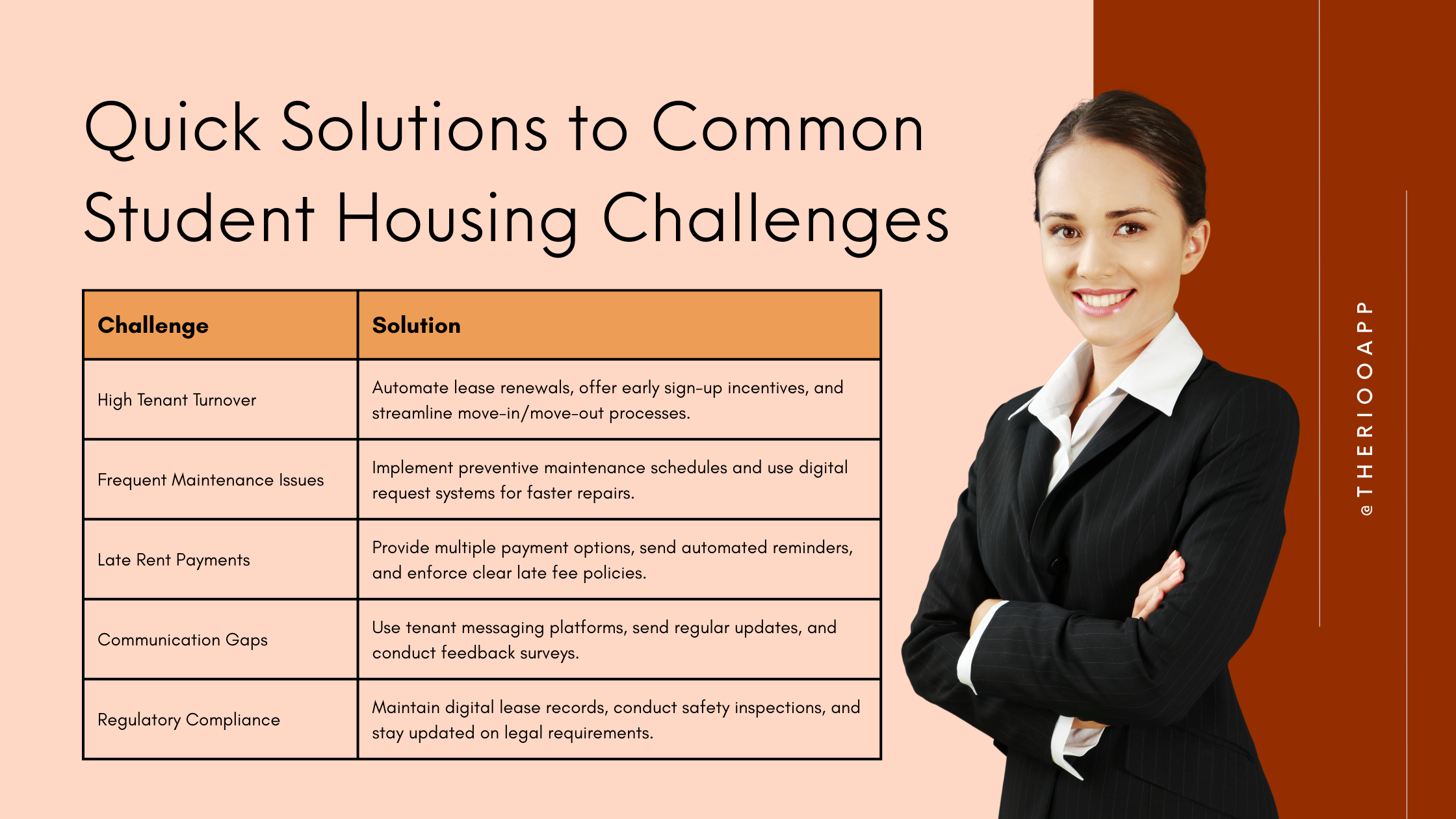Managing student housing comes with a unique set of challenges that require a proactive approach. Unlike traditional rental properties, student housing involves high tenant turnover, frequent maintenance issues, financial uncertainties, and the need for clear communication. Since students often rent for short durations—typically one academic year—property managers must constantly deal with move-ins, move-outs, and unit preparations. Additionally, younger tenants may not always be aware of property upkeep, leading to increased wear and tear and unpredictable maintenance requests.
Financial management can also be complex, as students may rely on scholarships, loans, or family support for rent payments, resulting in inconsistencies. Effective communication is crucial, as students expect digital-friendly interactions and quick responses. Ensuring compliance with housing regulations adds another layer of responsibility.
In this blog, we’ll explore the top 5 student housing management challenges and provide effective strategies to overcome them, helping property managers streamline operations and improve tenant satisfaction.
1. High Tenant Turnover in Student Housing
One of the biggest student housing management challenges is dealing with frequent tenant turnover. Unlike traditional rental properties, student housing sees tenants moving in and out regularly, often on a yearly basis. This creates a continuous cycle of leasing, inspections, and maintenance.
How to Overcome It:
Managing frequent tenant turnover requires proactive planning. Implementing automated lease management systems ensures lease tracking, while early marketing reduces vacancies. Lease renewal incentives, such as minor rent discounts, encourage tenants to stay longer. A structured move-in and move-out process using digital documentation streamlines transitions, ensuring faster unit preparation. These steps reduce financial losses, improve occupancy rates, and enhance the overall rental experience for both students and property managers.

2. Frequent Maintenance Issues in Student Rentals
With student tenants, maintenance issues can be unpredictable and frequent. Many young tenants may not be familiar with proper property upkeep, leading to increased wear and tear on rental units.
How to Overcome It:
Preventive maintenance is key to managing student housing effectively. Regular inspections of plumbing, HVAC, and electrical systems help detect issues before they escalate. Educating tenants on proper property care minimizes accidental damage. A digital maintenance request system enables quick issue reporting and response. Having reliable contractors on standby ensures urgent repairs are addressed promptly. These measures enhance property longevity, reduce unexpected costs, and improve tenant satisfaction, making maintenance management more efficient.
3. Financial Management and Rent Collection
Managing finances in student housing can be tricky due to irregular payment behaviors and financial instability among student tenants. Late payments or unpaid rent can affect property cash flow and increase management stress.
How to Overcome It:
Ensuring financial stability in student housing requires multiple payment options, including online transfers and mobile apps, making transactions more accessible. Automated rent reminders encourage timely payments, reducing missed deadlines. A clear late fee policy enforces financial discipline among tenants. Providing students with budgeting resources helps them plan payments better. These strategies reduce rent-related issues, ensuring a steady cash flow and minimizing financial risks for property managers while maintaining a professional landlord-tenant relationship.
4. Effective Communication with Student Tenants
One of the most overlooked student housing management challenges is maintaining clear and efficient communication with student tenants. Young renters expect quick responses and digital-friendly interactions.
How to Overcome It:
A centralized tenant communication platform simplifies interactions through instant messaging, maintenance requests, and announcements. Regular updates via email, SMS, or mobile apps keep tenants informed. Establishing an open-door policy fosters transparency and trust. Conducting quarterly surveys provides valuable tenant feedback, helping property managers address concerns promptly. Strong communication reduces misunderstandings, improves tenant satisfaction, and creates a sense of community within the property, leading to better tenant retention and smoother management operations.
5. Compliance with Regulations and Legal Requirements
Student housing properties must comply with local housing laws, fire safety codes, and lease regulations to avoid legal issues. Non-compliance can lead to fines, tenant disputes, or operational restrictions, making it essential for property managers to stay updated on evolving regulations and requirements.
How to Overcome It:
Staying compliant requires regular updates on housing laws and digital record-keeping of leases, tenant agreements, and property inspections. Routine safety checks ensure compliance with fire codes and legal housing standards. Seeking legal consultation when drafting lease agreements helps avoid disputes. Proper documentation minimizes liability risks and protects property managers from legal complications. Implementing these practices ensures a legally sound, safe, and well-regulated student housing environment that meets industry standards.
Conclusion
Managing student housing comes with a unique set of hurdles, from tenant turnover in student housing to handling maintenance issues in student rentals and ensuring effective communication with student tenants. However, with the right strategies, these student housing management challenges can be tackled efficiently.
By leveraging technology-driven solutions, proactive maintenance, structured financial systems, and clear communication, property managers can create a well-organized and tenant-friendly housing experience. Want to improve your student housing management processes? Start by implementing these best practices today!















